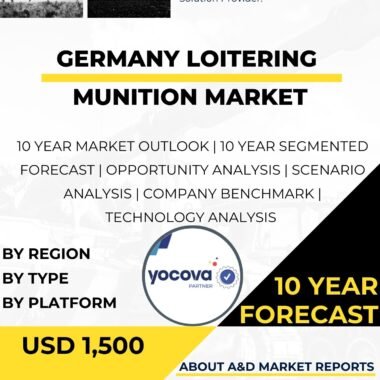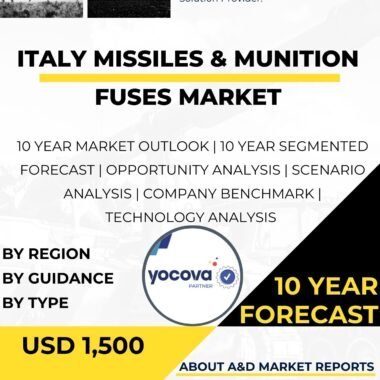Description
The Belgium smart weapons market is a significant segment within the country’s defense industry. Smart weapons, also known as precision-guided munitions, are advanced munitions equipped with guidance systems that enable them to accurately engage targets with precision. Belgium recognizes the importance of smart weapons in enhancing its defense capabilities, improving operational effectiveness, and ensuring mission success.
The primary driver for the Belgium smart weapons market is the need for accurate and effective munitions to meet the evolving operational requirements of the armed forces. Smart weapons provide enhanced precision, target discrimination, and reduced collateral damage compared to conventional munitions. Belgium’s focus on smart weapons technologies is driven by the need to enhance its defense capabilities, support its armed forces, and ensure the successful execution of military operations.
Belgium’s domestic defense industry plays a significant role in the development, production, and integration of smart weapons. Belgian companies, such as FN Herstal and Thales Belgium, have expertise in weapon systems and contribute to the country’s defense capabilities. These domestic capabilities foster innovation, create job opportunities, and contribute to the economic growth of the Belgium smart weapons market.
Collaborations with international partners and suppliers are also significant for the Belgium smart weapons market. Belgium often engages in partnerships with defense companies from NATO member states and other allied nations to access advanced smart weapons technologies, benefit from joint development programs, and ensure interoperability with allied forces. These collaborations enable Belgium to leverage global advancements in smart weapons, enhancing the performance, reliability, and effectiveness of its armed forces.
Furthermore, Belgium’s participation in multinational defense initiatives influences the smart weapons market. Collaboration within NATO and other international defense cooperation programs fosters interoperability, joint training exercises, and the exchange of best practices. This cooperation ensures compatibility and enhances operational effectiveness when conducting joint military operations with allied forces.
The Belgium smart weapons market faces challenges such as technological advancements, affordability, and export control regulations. Technological advancements in guidance systems, seeker technologies, and target acquisition algorithms require continuous research and development efforts. The Belgium market needs to stay at the forefront of innovation to provide state-of-the-art smart weapons that meet the evolving operational requirements and address emerging threats.
Affordability is an important consideration in the acquisition and deployment of smart weapons. Belgium’s defense industry must carefully manage budgets and allocate resources prudently. The cost of acquiring, integrating, and maintaining smart weapons should be balanced against the need for performance, reliability, and operational readiness, ensuring a cost-effective approach without compromising mission requirements.
Export control regulations govern the international transfer and trade of smart weapons. Belgium’s defense industry must adhere to international norms and regulations to prevent unauthorized access, proliferation, and diversion of such munitions. Compliance with export control regulations ensures responsible trade practices and contributes to international security and non-proliferation efforts.
In conclusion, the Belgium smart weapons market is a significant segment within the country’s defense industry. Advanced smart weapons provide critical capabilities for military operations, enhancing defense capabilities, improving operational effectiveness, and ensuring mission success. Domestic capabilities, collaborations with international partners, and Belgium’s participation in multinational defense initiatives drive the growth and development of the smart weapons market. As operational requirements evolve and technological advancements continue, the demand for advanced and effective smart weapons is expected to increase, fostering innovation, collaboration, and economic growth within the sector.




